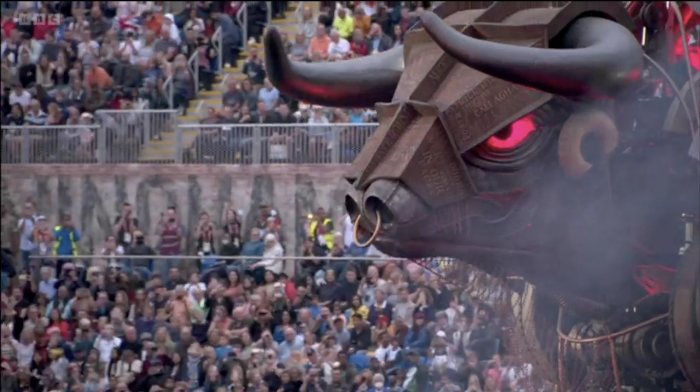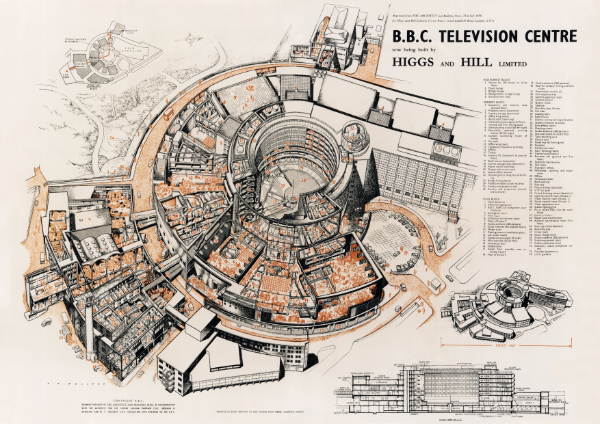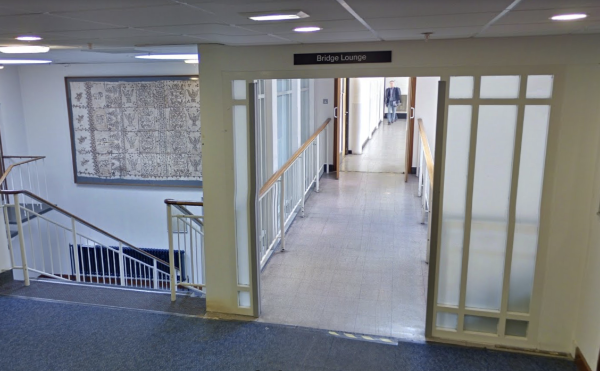There’s too much in my head. It’s 23:21 on July 28, 2022, and I’m sitting on a security barricade in Birmingham city centre, waiting for my wife Angela to get here on the shuttle bus from Alexander Stadium. It doesn’t seem all that long ago that we were in lockdown and everyone was stuck at home all the time, but tonight I’m outside and easily 150 people have walked by me in the last few moments.
I say 150 people, but they had the energy of about a thousand. All of them coming from the stadium, all of them coming from the Commonwealth Games 2022 opening ceremony – and only a few coming from performing there as Angela did. Dressed in a Peaky Blinders costume, Angela walked behind the athletes from Oceania, and then spent the rest of the night dancing in the centre of the stadium.
It’s not as if this is the first crowd I’ve seen and I’ve even been on these same shuttle buses. But it was heightened because of the contrast to last Saturday when I was fairly near the stadium and very near this security barrier, yet in such a flatter situation.
Those few days before now, I was busy having a stabbing sense of how much I missed just sitting in a Birmingham bookshop, how I missed just reading a book, having a drink, and not having a deadline or a pressure to get anywhere. But the stab was so particularly sharp and tearing at me because I was feeling it while I was actually doing every single one of those things.
I felt it when I was directly experiencing every bit of every thing I was missing so painfully.
I think now that it was the directly bit that was a problem. Yes, I was directly experiencing it all, but it felt forcibly indirect. It felt like everything around me belonged to before the coronavirus, like I was remembering what it used to be rather than feeling what it was. Or maybe it was that it felt like there was a film over it all. Like I was seeing through a glass, dimly.
And yet here I am now, crowds of people walking around me, every one of them coming from the opening ceremony that I just watched on TV, everyone a stranger, and I do not feel the same stabbing separation from what is around me.
There’s definitely an issue that this is a crowd with one tired and exalted mood, and that’s the same mood I have.
It’s the same mood I’ve had for a week, too. Saturday may have been spent examining those moments where I was disconnected from what I was doing, from when I felt like I was kept from my own actions by an abstraction layer. But Sunday onwards was about examining a different series of moments over and over, examining something I truly was just a spectator at, and yet which I felt properly present for, properly part of, properly and rightly proud of.
On Sunday, I was at the first dress rehearsal for the Commonwealth Games opening ceremony. Reality was helped through my being accompanied by an ocean of rain running into my eyes, into my skin, but it was all the deepest of pleasures and excitements and if I came close to being washed away, it didn’t matter.
Then on Tuesday, though, it was all the same again and all totally different because I was back for the last dress rehearsal. And as well as bright-hot sunshine, I was perhaps a twentieth of the way further around the stadium so everything was framed from a different angle.
It was all about watching, until it was all about feeling. I was looking for Angela, I was looking at this mesmerising spectacle. And at points on Tuesday I was also looking through binoculars.
Wait, it’s 23:34 on Friday and I’ve just had a notification that Angela is sharing her location with me. She’s three miles out but heading this way. I’m typing rather slowly tonight because I’m doing it on the glass of my iPhone but also because I keep hearing people talking about the Bull from the ceremony. It is most definitely a Bull with a capital letter. Someone is also saying they’re too young to know who Duran Duran is. I’m so old I’m wondering if it’s who Duran Duran are.
Two miles out.
And I’ve just chatted with a woman who is organising transport for athletes throughout the games – starting at 05:00 tomorrow. Hopefully she’ll still be buzzing.
And now one of the dancers. There was more separation with her, she was giving out the sense that I was audience while she was truly part of the show, yet I enjoyed seeing her pleasure, her satisfaction at a job done marvellously well.
Plus, this is a really good security barrier I’ve picked: people keep stopping to put on coats and arrange bags and talk with me.
23:42. Angela is 0.8 miles away. I’m off to bounce at her. Back in a sec.
00:33. We’re home and Angela is flat-out exhausted but I’m too wired to shut up. So I was saying, throw in the binoculars and also how I spent Friday evening watching the BBC coverage of the ceremony, and I have four vivid, visual memories of the same event from four different angles and in a range of weather from sunburn on the left to snorkelling on the right.
Plus I have what little snippets I’ve managed to get out of Angela over the weeks of her rehearsals. Plus I’m surprised how many people I know worked on the show, including its writer, Maeve Clarke.
And let this be a summary of both my town and her writing. I do not believe there is another city in the world that would puncture its own celebration of itself and its true glories by shining a light on the worst moments in its history. Birmingham did that tonight and Birmingham pulled it off: it made the night stronger, it made the city stronger.
It made the celebration bigger, I think. There was a sense of exhilarated hope for the future and I was moved every time I saw it and from every angle.
I suddenly remember moving to London for a job and being forgiven for coming from Birmingham. The man who forgave me came from Liverpool. Or possibly Manchester, I stopped listening to him mid-sentence. And I remember a woman mocking the Birmingham accent, oblivious to how she had an impenetrably coarse Cockney one and to why I was laughing at her.
So I’ve always been able to get angry when people dissed Birmingham, but I haven’t felt the city was part of my writing, was part of me as a writer. I’ve actually envied writers who have very clear and strong sense of location and of home in their work, and I’ve lamented lacking that myself.
But not now.
Now, I get it. It’s 27 years since the telephone number prefix for Birmingham was changed to 0121, a number that kept coming up in lyrics in the ceremony. Actually, I just checked and, startlingly, it’s 9966 days since that happened. And only now do I see the 66 and 99 quote marks around the numbers, only now do I see that “oh, one to one” that’s right there in my phone number. Birmingham truly does welcome everyone and it’s not in some en masse sense, it’s an individual welcoming, a specific recognition that you are special and that you are wanted here.
And only now do I also see that this constant urge I’ve always had to credit everyone else and downplay anything I do myself is straight-up, full-on Brummie. And I’m proud of that.
But I’m just more proud of Angela, of Maeve, and everyone who made this thing that was bigger than any one of them, any one of us.


